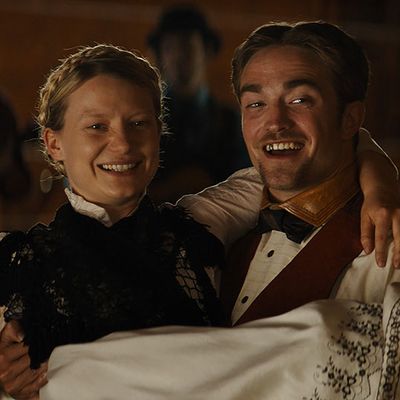
Few filmmakers earn the adjective “offbeat” as definitively as the Zellner brothers, David and Nathan, whose new Western (premiering at Sundance), Damsel, is a goof on the genre in which no trope is left unmolested and nothing goes the way it’s supposed to. Probably you should clear your head and go in thinking you’re going to see a conventional Old West kidnapping adventure story. Then you’ll be delighted or possibly irritated when it turns out to be a clown show with instances of carnage. I was alternately delighted and irritated, though mostly a very happy camper.
Robert Pattinson is top billed as Samuel, the earnest would-be savior who heads way, way West (to the ocean, in fact) to rescue his true love, Penelope (Mia Wasikowska), from a kidnapper holed up with her in a little house in the middle of nowhere. He’s the nominal hero — as well as a sometime troubadour who strums his guitar by a campfire and sings a ballad of love called “Honeybun.” (“You’re my honeybun / my honeybun / my honeybun…”)
Samuel has things all planned out. He has even hired a parson to accompany him and marry the pair after he saves Penelope and gets down on his knees and proposes. He’s toting a gift for her, a miniature horse he calls Butterscotch, after her favorite candy. The little horse, by the way, appeared onstage at Sundance after the film, though mostly turned away from the audience, unaccustomed to rich people with second homes wielding cell phones and industry types holding forth on other movies. (“It was gripping, I thought.” “Definitely third-act problems, though.” “Oh, definitely.”) In a cute touch, the audience left the theater to find Sundance volunteers handing out butterscotch candies. (As I write this on Wednesday, January 24, it’s Sundance Volunteer Appreciation Day.)
Back to the movie. Samuel knows that said parson, Henry (David Zellner), is a drunken stumblebum, but not that he’s not really a parson. He is in fact an Easterner looking to clean his slate who accepted the parson garb in a prologue from a preacher who once strived to “bring religion to the savages” but reached the end of his tether. That prologue is one of the best things in the movie — a minimalist comic masterpiece in which Robert Forster does more with single syllables than other actors with whole mini-series. After seeing his turn here and his more sober performance in another Sundance film, What They Had, I’m ready to proclaim that he’s due for a second (the first was Jackie Brown) major comeback.
Anyway, Samuel quickly establishes himself as a weirdo (the ballad doesn’t help his case) and that’s all I can say about that. Soon Penelope takes over the movie. She’s the title character but “damsel” isn’t a word that sums her up — though she is certainly in distress. That’s all I can say about that, too.
The Zellners’s storytelling technique in Damsel is to begin a sequence with a startling shot (macabre, grotesque, nonsensical) and then explain it after that fact. That’s always a killer. The cast gets into the high spirits. Since that blockbuster Twilight mess, Pattinson has labored to shed his dreamboat image in favor of cretins and hustlers, and here he gives himself a gray metal front tooth and pitches his voice into the high twerpy zone. He’s most amusing. Even funnier is Wasikowska, playing it completely straight and, at times, terrifyingly violent. She can do no wrong, in my book. David Zellner is wonderful as the hysterical, emotionally needy fake parson who describes himself to a Native American character, Zachariah Running Bear (Joseph Billingiere), as a “soulless neophyte of paleface proportions.” Zachariah, by the way, supplies the film’s most nudge-nudge-wink-wink moments and feels a mite cheap — although Billingiere has a great grave face and movies are poorer for his death at age 68.
The music is the other terrific thing. It’s by the Octopus Project, whose acquaintance I’m happy to make, and features spooky guitar twangs and the occasional synthesized otherworldly wind. Its expressiveness helps the Zellner brothers steer clear of outright tomfoolery and find a mood all their own, in which comic ineptitude is born of loneliness and desperation.


